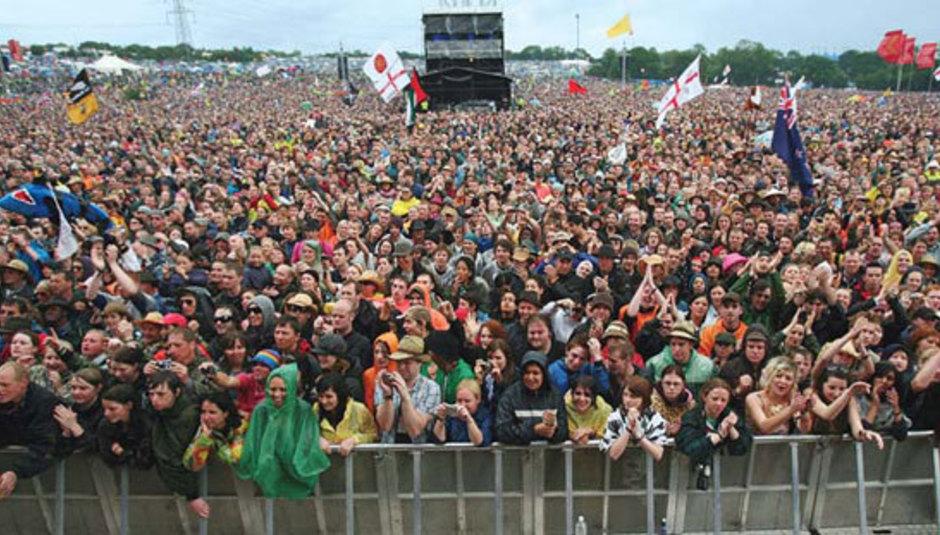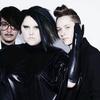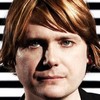In celebration of managing to wheedle Glasto review tickets and a photopass for the first time (oh, and also it being one of the biggest musical and cultural events in the British calender), DiS is having a wee Glastonbury week this week, in advance of everybody actually going buggering off next Wednesday. We kick off with a ponder over what the festival is meant to mean to the average indie kid in 2009.
Rock lore doesn’t seem to have that much to say about Shakepeare’s Sister’s 1992 headline slot at the Glastonbury festival. Or Ash in 1997. Or Skunk Anansie in 1999. Or Travis in 2000. Or Moby’s in 2003. Funny that.
In fact as far as I can tell there are only two actual, honest to god, definitive, gold-plated, one hundred percent irrefutably, cast-iron examples of headline sets that the BBC’s freakishly non-aging doyenne of all things Glastonbury, Jo Whiley, would smirkingly refer to as ” Glastonbury moments”.
One was when some benevolent deity caused John Squire to break his collarbone prior to the 1995 festival, meaning the crowd were spared the honking awfulness of The Stone Roses, top of the bill honours instead granted to a then unstoppable Pulp; the other was Thom Yorke asking for the lights to be switched on during Radiohead’s 1997 headline slot, thus bestowing the sensation of love on 100,000-odd of his fans, presumably for the first time. If you’re going to be generous, Orbital's 1994 second stage turn still gets an occasional mention, while you could also probably point to Michael Eavis taking a punt on Coldplay in 2002, their stadium chops surprising a field’s worth of people before A Rush Of Blood To The Head sent them stratospheric.
That’s about it, though. Not that it’s not a great festival. Not that any number of individuals won’t have a hundred moments they personally enjoyed more than the aforementioned. But that clutch of instances sort of seems to be what the mainstream media – I’m talking national newspapers and the BBC – have in mind when they attempt to define what they believe Glastonbury should be about, or at least as a musical entity.
Video: Pulp: 'Common People' (live at Glastonbury 1995)
Or that’s my best guess anyway, those handful of zeitgeisty occurrences seemingly enough to be trundled out as examples of what-Glastonbury-is-all-about year-on-year, commentators happy to ignore the fact that there’s near enough always at least one painfully out of their depth indie band (Skunk Anansie), big-at-the-time chart fodder (Travis, Stereophonics), or somewhat misfiring old-timer (Rod Stewart) in a Pyramid Stage peak slot.
I say this, because the last two years have marked a media trend in scrutinising and criticising the line-up, a reading of the runes and passing judgement that suggests nothing less than a trio of ‘Glastonbury moment’-givers will do. This obviously all stems from last year’s festival, which famously had some problems selling out, though sell out it did.
So here are some facts. The Glastonbury Pyramid stage line-up on Friday last year ran thusly: Kate Nash, The Subways, Get Cape. Wear Cape. Fly., KT Tunstall, The Feeling, The Gossip, Editors, The Fratellis, King Of Leon. A talk about farming from Michael Eavis would have been twice as interesting; Jay-Z’s intro video at least 50 times so. Moreover it was generally accepted that the 2007 festival had not exactly left people hungry for more, with money-in-the-bank turns from Arctic Monkeys and The Killers misfiring due to sound problems, and possibly the most oppressive rain to date. Yet somehow the whole thing descended into a farrago as to whether or not it was appropriate to have Jay-Z headlining. I’ll say again: SKUNK ANANSIE have headlined this thing. And this year, of course, the people who were wondering if Jay-Z slowed sales have been moaning about the age of the headline acts. As if, in any way, Glastonbury has any astonishing track record of putting its finger of the pulse of anything other than middle England. Is the subtext here SERIOUSLY that they've lost hip points because there’s no daring new acts like Coldplay or Kings Of Leon amongst the Neil Young/Bruce Springsteen/Blur triumvirate?
Video: Skunk Anansie: ‘We Love Your Apathy’ (live at Glastonbury 1999)
When I was a young teenager, the festival – which had hitherto been less synonymous with music than hippies, travellers, drugs and men dressed as fairies sternly informing you ”it’s not about the music” – entered a sort of synchronicity with the Britpop movement. The triple whammy of 1994’s Levellers, Elvis Costello and Peter Gabriel topped event was the last hurrah for the ‘old’ Glastonbury: Blur, Oasis and, of course, Pulp all took starring turns there in the years to come, with Radiohead adding a splash of edge as Britpop faded. And as such there was definitely a feeling growing up back then that Glastonbury was ‘our’ festival, the biggest musical event of the year, at which reputations were cemented and musical legends born. The BBC coverage was nothing like it is now, nor, I do believe, did The Guardian go nearly so ape for proceedings. Reportage was centred on NME and Melody Maker, which is where it seemed to belong, and they were generally of the attitude ‘well it’s nice if the headliner is actually good, but they probably won’t be’ (I dimly recall a Melody Maker that took considerable glee in suggesting REM’s 1999 set would definitely be shit unless they simply played Murmur and Green back to back).
Now... now people like The Telegraph’s Neil McCormick and NME’s Luke Lewis are suggesting Glastonbury may have lost it by dint not having a Coldplay or whatever on the books this year. The argument seems broadly insane – Springsteen, Neil Young and Blur are three headliners of mass appeal and impeccable critical repuation, there’s an infinite amount of other stuff to be getting on with at the same time. Looking at the other Glastonbury-level festivals this year, what do people want? Arctic Monkeys, Oasis, Killers, Kings Of Leon, Radiohead; Glastonbury has been there there, done that, and let’s be honest, those band’s ratios of old fans to young is almost certainly not as out of whack with Springsteen as their publicists might like. There are grumbles, but nobody seems to be raising particularly viable alternatives (though McCormick rather laughably seems to point to Bestival’s Kraftwerk and Massive Attack as headliners with more yoof appeal).
It would be tempting to dismiss all this as the blathering of the out of touch, but this is the thing: maybe moaning about it has become the sport of newspaper commentators lurching toward middle age because culturally this IS their festival now.
Obviously for an argument involving a ‘their’ I have to create a rather sweeping ‘us’, but you know, let's for the sake of argument say DiS loosely represents teen to twentysomething indie enjoyers with a strong interest in the music of now. Ten, 15, years ago Glastonbury was unequivocally the festival for that crowd. Now... is it, really? The explosion of European festivals and niche events like ATP has surely stripped away the idea that Glastonbury’s everyman approach could possibly offer most of us our wet dream line up in the way that, say Primavera could. And the festival’s increasing colonisation by the BBC and ‘quality press’ has served as an epic PR job in terms of shifting its image away from being a place full of crusties and skint young people. Instead its figurehead is lovely Jo Whiley, having cups of tea and smiling in benignly patronising manner as the camera occasionally cuts to the token shot of somebody in a silly hat doing something silly while on some drugs. Has Glastonbury moved on, transcended its way to being a festival for the populace as a whole (with a fruity middle-class bias, natch)? It’s been all but said that Emily Eavis’s Park Stage is a sop to the likes of us, a sign that we're an integrated part of the festival, but not the main targets we perhaps once were.
So DiScuss: nobody is disputing Glastonbury’s greatness, nor that pound for pound and given fair weather, it probably out-funs every festival under the sun. But is it ‘our’ festival – as I swear it was last decade – or have things shifted? Older readers – do you feel things have changed? Younger readers – what is your perception of the festival if you weren’t really aware it until this decade. Foreign readers: er, sorry.






















